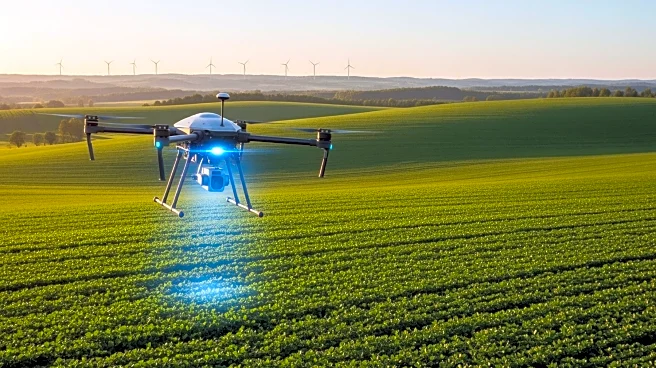What's Happening?
Artificial intelligence (AI) is increasingly being integrated into agricultural practices to enhance sustainability and resilience against climate change. Guillermo Medina, Chief Digital Officer at Pantaleon Sugar Holdings and Lead at Stomata Labs, discusses
how AI is revolutionizing farming by providing prescriptive, real-time insights that improve efficiency and crop yields. AI-driven precision agriculture utilizes tools like GPS and automation to optimize inputs such as water and fertilizers, potentially increasing crop yields by up to 25 percent. The market for AI in agriculture is projected to grow significantly, from $1.7 billion in 2023 to $4.7 billion by 2028. This technological advancement is part of a broader shift towards regenerative farming practices, including the use of biochar and microbial soil enrichment, which enhance soil health and carbon sequestration.
Why It's Important?
The integration of AI in agriculture is crucial for addressing the challenges posed by climate change, such as weather volatility, droughts, and floods. By optimizing resource use and improving crop yields, AI helps farmers adapt to these challenges, ensuring food security and reducing environmental impact. The shift towards regenerative practices supported by AI not only enhances soil health but also contributes to carbon sequestration, potentially locking away up to 5 billion metric tons of CO2 equivalent per year until 2050. This approach reduces reliance on petroleum-based fertilizers and promotes sustainable farming, aligning agricultural practices with environmental conservation goals.
What's Next?
As AI continues to evolve, its role in agriculture is expected to expand, offering more sophisticated tools for data analysis and decision-making. Farmers and agribusinesses are likely to increasingly adopt AI technologies to improve operational efficiency and sustainability. Ongoing research and development in AI applications for agriculture will further refine these technologies, making them more accessible and effective. Stakeholders in the agricultural sector, including policymakers, investors, and technology developers, will need to collaborate to support the widespread adoption of AI and ensure its benefits are maximized across the industry.
Beyond the Headlines
The adoption of AI in agriculture represents a significant cultural shift towards embracing technology as a partner in sustainable farming. This transformation requires a mindset change among farmers, who must become comfortable with data-driven decision-making and technological tools. Ethical considerations around data privacy and the equitable distribution of AI benefits will need to be addressed to ensure that all farmers, regardless of scale, can access and benefit from these innovations. Long-term, AI has the potential to redefine agricultural practices, making them more resilient and aligned with environmental sustainability.
















